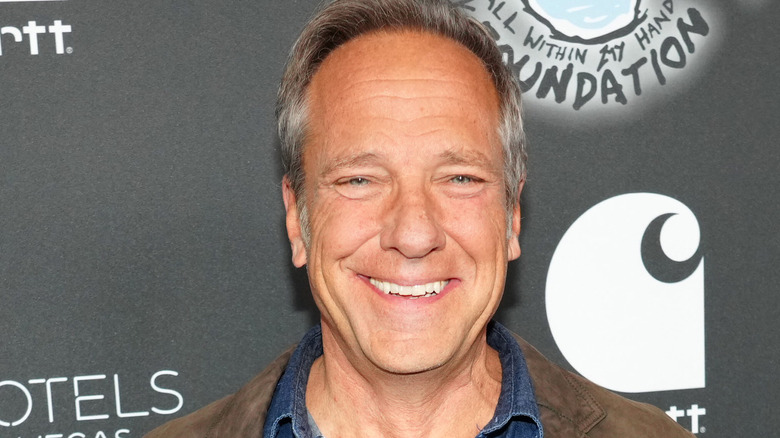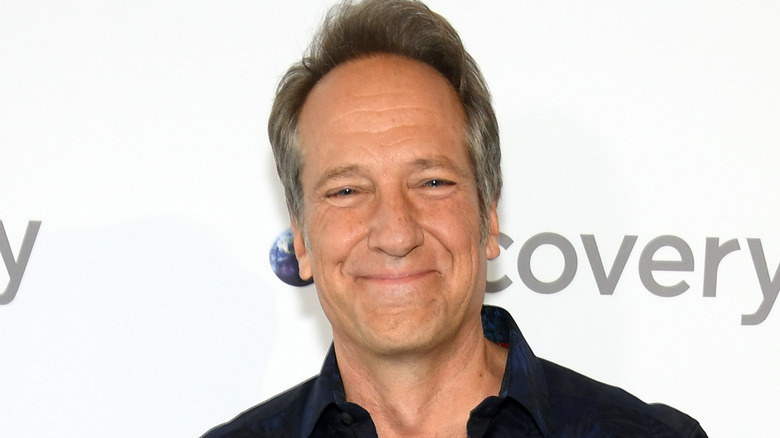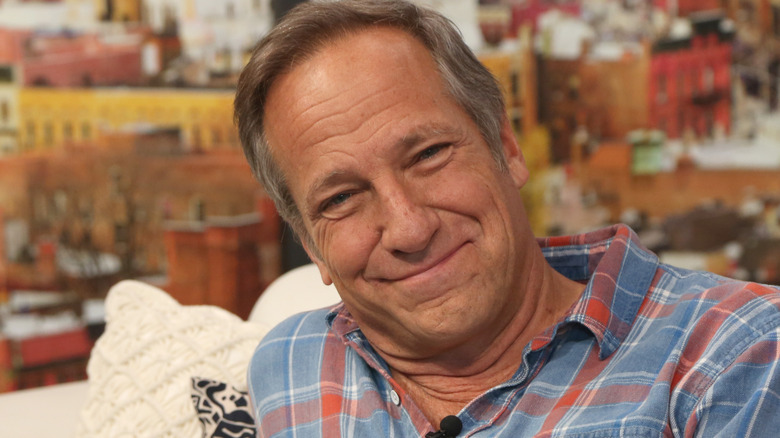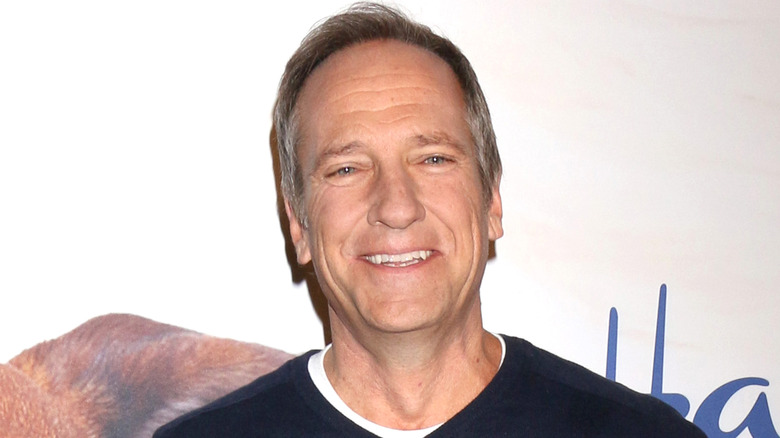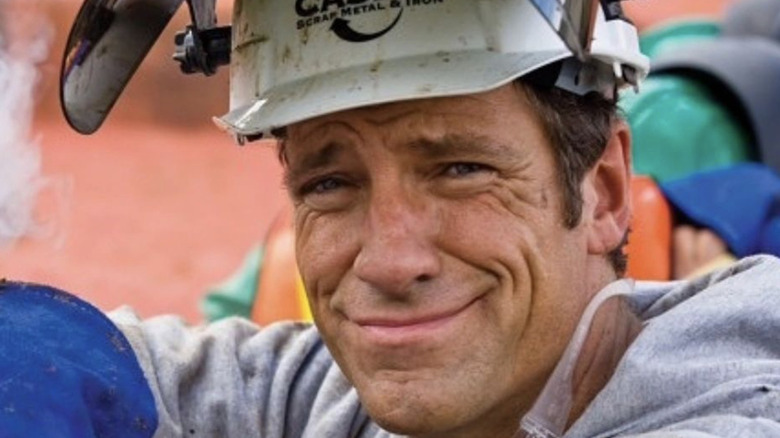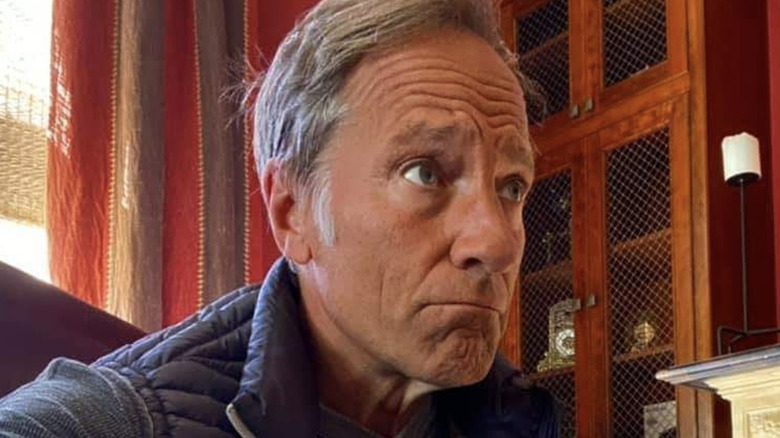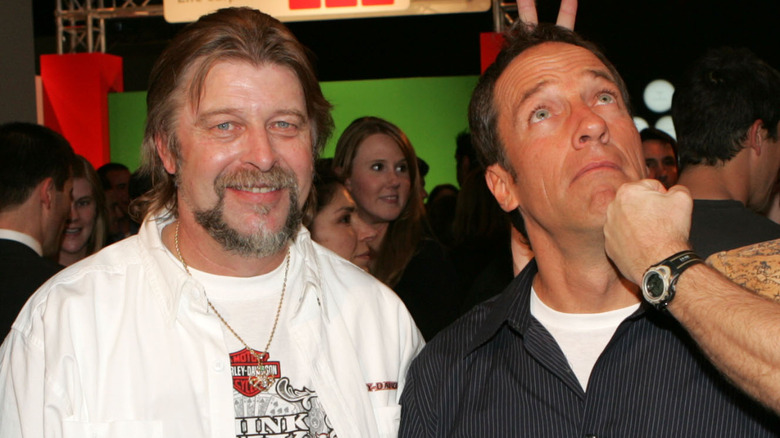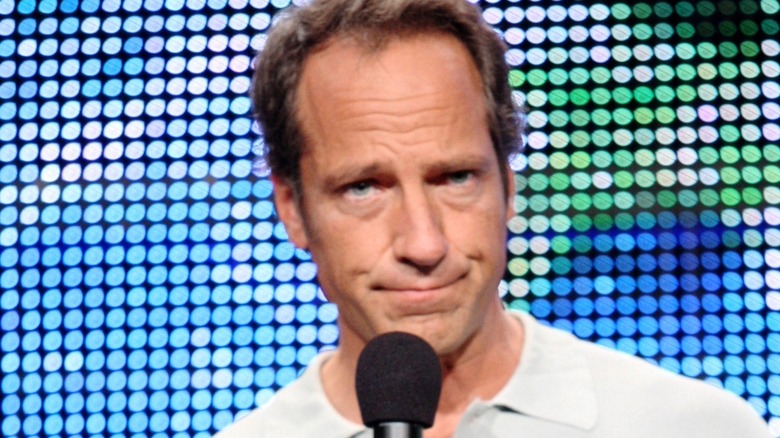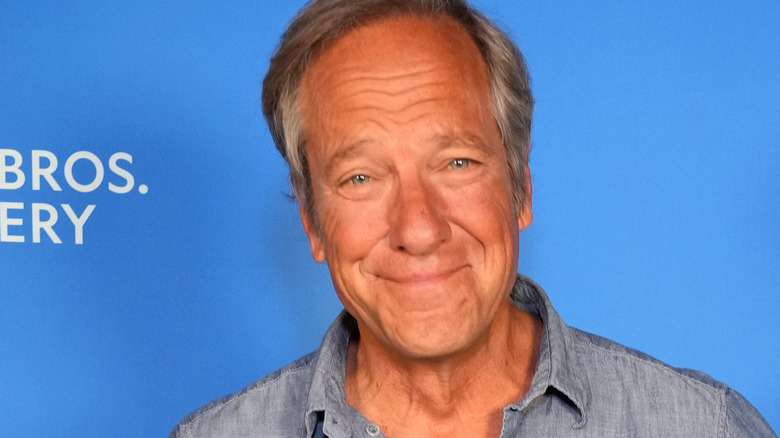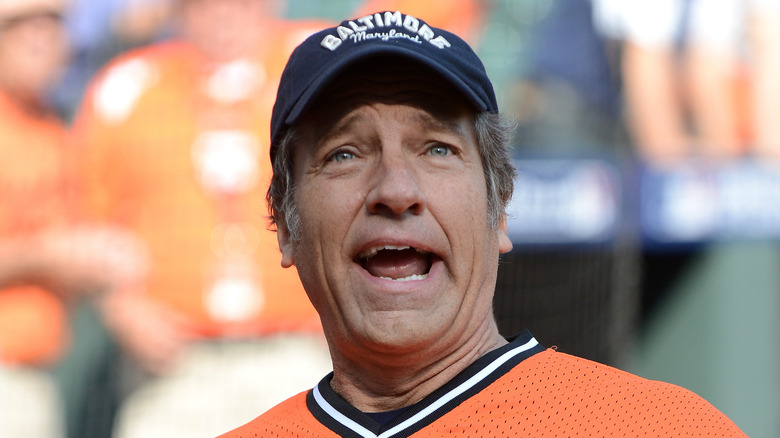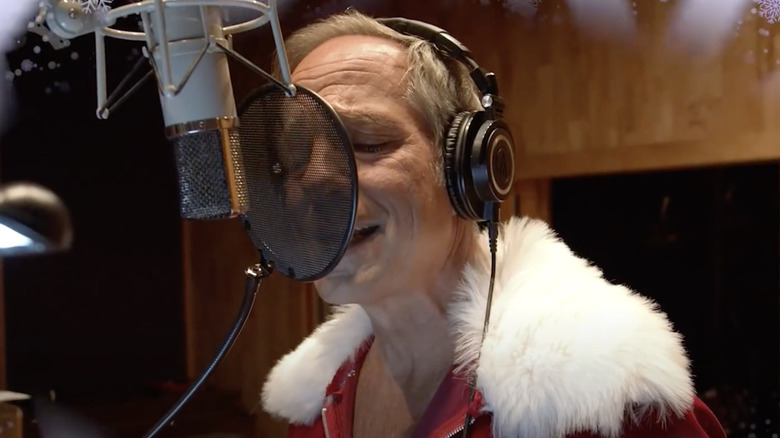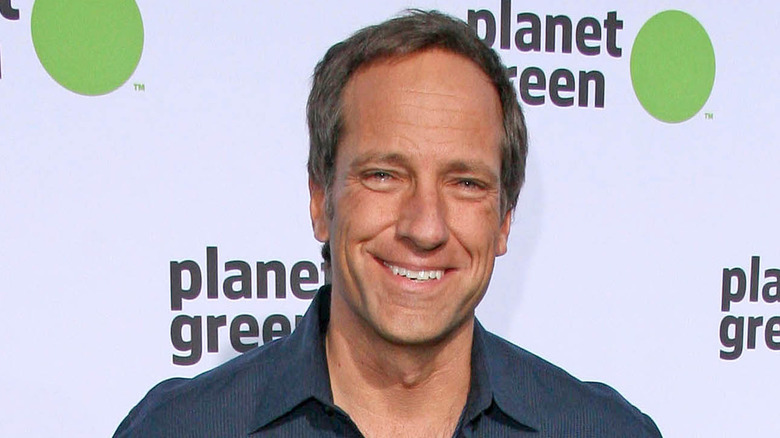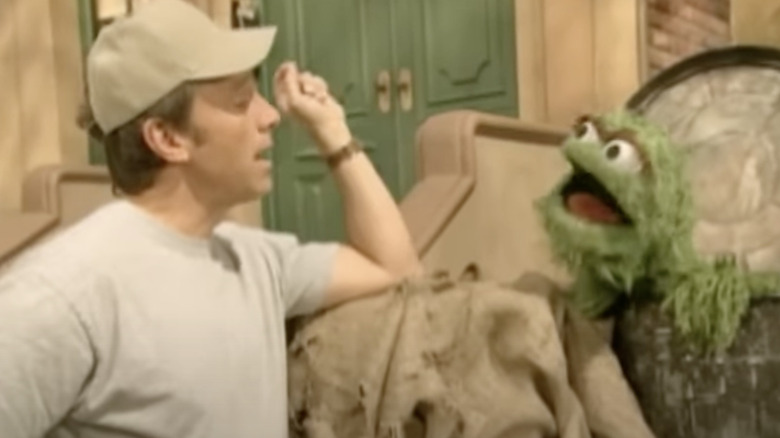Weird Things You Didn't Know About Mike Rowe
One half smart-aleck TV host and one part respectful, empathetic, and curious interviewer, Mike Rowe rocketed to fame and fortune as the host of "Dirty Jobs" in the 2000s. Rowe highlighted and heralded little-known jobs that not many people want to do but which someone must, and his easy-going, can-do spirit resonated with cable TV viewers who made the show a hit for well over a decade. At the same time, Rowe extended his amiable hosting and deep-voiced narration skills to a number of other populist reality show hits, like "Deadliest Catch," "The Ultimate Fighter," "American Chopper," "Returning the Favor," and "How America Works."
Most notable for detailing the professions and callings of other people, Rowe similarly leads a unique and story-filled life. Even before he became a well-known and trusted celebrity voice and advocate after years of trying to make it into the entertainment mainstream, Rowe was enjoying all sorts of adventures, triumphs, and just plain strange experiences in which he found himself. Here's a look into the sometimes very odd life of Mike Rowe.
Mike Rowe sang opera professionally
After he obtained his bachelor's degree in communications in 1984, Mike Rowe tried to enter the workforce. He wanted to be a voiceover artist, but residing in Baltimore, Maryland, at the time, he couldn't find employment in his field. Part of the problem was that he wasn't certified to work in what few productions were up and running in Baltimore because he wasn't a card-carrying member of either of the two major performer labor collectives, SAG and AFTRA. "I couldn't get those cards unless I did union work. But I couldn't do union work without those cards. Classic catch-22," he told "The Glenn Beck Show."
Then Rowe discovered a workaround: A SAG or AFTRA card could be purchased if he were to already be a member in good standing of another entertainment union, the American Guild of Musical Artists. That includes opera singers, so Rowe auditioned for the Baltimore Opera. "I learned the shortest aria I could find," Rowe said, teaching himself "The Coat Aria" from Puccini's "La Bohème" by repeatedly listening to it and singing it back to himself. Unbeknownst to him, he had a decent baritone voice, and he got the job and joined the ensemble. "I stayed seven years in the opera," he said.
He's the king of obscure media
By the early 1990s, Mike Rowe's career as a voiceover artist and TV personality had started to take off, and he landed a string of overlooked, barely noticed, and now forgotten utility hosting gigs. One of Rowe's first-ever screen credits was as the cohost of the 1990-1991 travelogue "Romantic Escapes." A few years later, he hosted the cable TV health and medical magazine series "Prevention's Bodysense," virtually simultaneously with "No Relation," an early FX series and a dumb game show someone should've been fired for because its premise revolved around people with the same name.
Some of Rowe's other resume-building, dues-paying jobs from the '90s included starring in the perpetually running instructional guide for the PrimeStar satellite TV service, playing a game show host named "Bobby Arpeggio" in the CD-ROM music trivia game "Radio Active," and anchoring a TV commercial for a fish deboner tool called The Wunder Boner.
Mike Rowe worked for QVC on four separate occasions
While still living in Baltimore and looking to break into television, Mike Rowe visited a friend tending bar at a local tavern, and he had the TV set on QVC. The home-shopping channel had studios a couple of hours away in Pennsylvania, and Rowe bet his bartender friend $100 that he'd ace his audition and advance to the next round of selections. Instead, QVC hired Rowe immediately, and he was given a middle-of-the-night shift. "I looked at the overnights as an opportunity to essentially do the late-night talk show I always wanted to do without permission," Rowe told NPR's "All Things Considered." That meant mocking all the products he was tasked with promoting to viewers, including porcelain dolls, a cat toy, and cheap jewelry.
For his behavior, Rowe was fired. Then QVC reached out and rehired the TV personality, who once more ran afoul of management. All told, QVC terminated Rowe three times, and after he was hired back once more, he quit of his own volition.
'Dirty Jobs' has had several incarnations
Mike Rowe is synonymous with "Dirty Jobs," the Discovery Channel series that featured its host documenting and participating in unseemly but important sources of employment. The show has been on and off television for over two decades, and it's based on a local TV feature starring Rowe. After reading George Plimpton's "Paper Lion," in which the author wrote about football by participating in an NFL training camp, Rowe got the idea to similarly film himself doing things he had no business doing.
With the help of James Reid, the producer of "Evening Magazine," the San Francisco TV show he'd recently started hosting, Rowe decided on profiling tough and disgusting jobs. In 2002, the first "Somebody's Gotta Do It" piece aired on "Evening Magazine," with Rowe shadowing a man who removes animal waste from the San Francisco Zoo.
Thinking the concept could fuel a full-length, national TV series, Rowe sent clips to multiple networks. Only the Discovery Channel showed interest, but told Rowe to run the idea through a production company first. With Pilgrim Films on board, Rowe sold "Dirty Jobs" to the Discovery Channel, which first aired it as a series of specials in 2003 before becoming a proper show in 2005. "Dirty Jobs" was once canceled in 2012, only for CNN to revive the show under its original name, "Somebody's Gotta Do It." When that show went out of production, the Discovery Channel rebooted "Dirty Jobs" in 2020.
'Dirty Jobs' disfigured Mike Rowe
The entire point of "Dirty Jobs" is to engender appreciation and respect for obscure and grueling labor sectors. Mike Rowe learned firsthand about one of the most dangerous jobs on "Dirty Jobs" when some poor choices in handling tricky equipment left him with a gruesome injury.
Rowe endured numerous painful but ultimately superficially damaging accidents through the initial run of "Dirty Jobs." "I have been really fortunate in the sense that nothing major has gone wrong," he told Entertainment Weekly. "I've gotten stitched up three or four times. I've broken a rib, I've broken a toe, I've lost three fingernails." In a first-season episode focusing on a blacksmith, he sustained something a bit more serious. Rowe set up a shot where he'd turn on a portable blast furnace with the initial flames seen reflected in his eyes. Rowe turned on the machine, and the fire behaved as planned, but in a bigger way than expected.
"The gas accumulates, so the flames shot out, wrapped around my head and burned my eyebrows off," he said. That burst of heat instantly melted Rowe's contact lenses, gluing them to his eyeballs. "Pulling pieces of plastic out of your eyes, bad deal," he explained. The shot made it into that episode of "Dirty Jobs."
He's the 'Deadliest Catch' lost cast member
He wasn't on those sea-tossed fishing vessels trolling for crabs off the coast of Alaska, but Mike Rowe did narrate many of the most harrowing moments on "Deadliest Catch." Rowe received two major career boosts at virtually the same time. In 2005, the Discovery Channel started airing two reality shows about dangerous and interesting careers: "Deadliest Catch" and "Dirty Jobs." At first, producers and Rowe decided that the TV personality should be an on-board host for "Deadliest Catch," reporting on the action and telling the audience what was happening as it unfolded.
Rowe filmed some material in this manner before the Discovery Channel also ordered "Dirty Jobs," a show he helped create and planned to host. The network gave Rowe a choice: He could appear as an on-camera host on one of the two similar series, and then narrate the other. Rowe opted to continue hosting "Dirty Jobs," and then he became the narrator for "Deadliest Catch." The footage of Rowe on fishing boats has never been used on the show or publicly released.
Mike Rowe fought a drone
In September 2016, Mike Rowe was asleep in his San Francisco area home when he was awakened by what he initially thought was a bee buzzing in his ear. As he grew more alert, he noticed the true source of the noise was coming from outside his window, and when he withdrew the drapes, Rowe came face-to-face with a camera-enabled drone. "I moved onto my second instinct, an irresistible urge to blow the contraption out of the sky," Rowe recalled on Facebook.
After retrieving a shotgun, he moved to a deck to situate himself below the drone. Realizing he was about to fire into a camera recording him, while he was also completely nude, Rowe assessed the situation. "It occurred to me that nothing good can come from an angry B-list celebrity standing on his deck with no clothes and a loaded shotgun." He cocked the gun, the drone tilted the camera to get a better shot, and Rowe stood down. "I'd like to tell you I stopped because I realized that discharging my weapon in such a fashion would be frowned on by the local constabulary. But really, what stopped me was the realization that somewhere nearby, a drone operator was staring at his monitor, pondering the image of a very naked guy with a very familiar face, pointing a shotgun into the lens of his GoPro."
He got death threats, and was the victim of a death hoax
As a labor advocate and well-known narrator, Mike Rowe was a solid choice to voice a 2014 Walmart commercial touting the retailer's commitment to stocking domestically produced items. Underscoring footage of U.S. factories and laborers, Rowe described Walmart's plan to buy $250 billion in U.S.-made goods over a 10-year period. The outrage for Rowe over the spot arrived quickly and furiously.
The reputation of Walmart, accused of large-scale underpayment and exploitation of its massive workforce at the time, didn't mesh with Rowe's consistent and outspoken support of working people, according to critics. He lost his commercial voiceover deal with Ford Motor Company, and he claimed to have received more than 5,000 letters of complaint from members of the labor organization Jobs with Justice. Rowe was also the recipient of numerous death threats.
None of those promises of violence ever came to fruition, but Rowe did curiously join the club of celebrities declared dead when they weren't. In 2016, some media outlets reported that gunfire was reported at Rowe's home, and that the reality star had died from shots sustained in the melee. There was no truth to the story. "I always hoped that sooner or later, I'd come home after a long day, open a beer, glance at the headlines, and have the opportunity to quote Mark Twain. 'The reports of my death have been grossly exaggerated,'" Rowe explained on Facebook.
Mike Rowe sold a lot of Girl Scout Cookies
In 2017, then-11-year-old Charlotte McCourt was affiliated with a South Orange, New Jersey, Girl Scout troop and embraced some curious tactics to beat her personal record of 300 boxes of Girl Scout Cookies sold. She snuck onto a computer owned by her father, Sean McCourt, producer of Mike Rowe's podcast "The Way I Heard It," and wrote a letter to a wealthy family friend after being told he planned to buy a huge amount of cookies and send them to American troops stationed around the world. But in the name of full disclosure, the young McCourt provided the wealthy benefactor with blunt reviews of the Girl Scout Cookies. "Alone, it's kind of boring," she critiqued the shortbread Trefoil. The Do-Si-Do scored a five "for its unoriginality and blandness" (via NJ.com).
Rowe found Charlotte McCourt's letter so funny — and her cause so noble — that he made a Facebook video about the sales drive. Ten million people saw the clip, and the amplification helped McCourt sell a lot of cookies for those soldiers to enjoy. Thanks to Rowe's assistance, a total of 26,086 boxes sold, far exceeding the scout's initial goal of surpassing 300.
He scored a number one novelty hit
An untrained, self-taught singer with a naturally robust voice who talked his way into the Baltimore Opera in 1984, Mike Rowe returned to music on a lark nearly four decades later. And once again, Rowe was extremely successful. In 2021, he brought "Dirty Jobs" back to television, inspired by the people who provided essential and emergency services during the COVID-19 pandemic and associated lockdowns. To promote the new "Dirty Jobs," Rowe collaborated with John Rich, one half of the popular country music duo Big and Rich, on a Christmas pop song.
Within days of the release of "Santa's Got a Dirty Job" in December 2021, the song, officially attributed to Rich and Rowe, instantly became the No. 1 song on Billboard's Digital Song Sales chart, meaning it was the most-purchased music download in the U.S. for the week, bought 13,000 times and beating hits by Dua Lipa, Elton John, and Mariah Carey. Characterized as a country song because of Rich's involvement, "Santa's Got a Dirty Job" also headlined the Country Digital Song Sales chart and debuted at No. 35 on Billboard's main country music list.
He does for Eagle Scouts what the president used to do
There's a long complicated history of the Boy Scouts, and reaching the organization's highest rank of Eagle Scout brought with it certain bonuses. It's such a rare achievement that Eagle Scouts historically receive a letter from the sitting President of the United States. When Mike Rowe attained his Eagle Scout status in 1977, he received a congratulatory, signed note from Gerald Ford. Upon closer examination, and by looking at the letters other Eagle Scouts from around the country had received, Rowe realized that his note was exactly like all the others, a mere form letter.
After "Dirty Jobs" made him famous, Rowe started his own Eagle Scout letter campaign. Newly minted Eagle Scouts or their relatives can request Rowe to send a letter. The note outlines Rowe's history and frustration with the Eagle Scout form letter program while also serving as a form letter itself — it cheekily claims to be personalized and special because the recipient fills in the blanks where all the personal information is supposed to go. Rowe also parlays some wisdom to Eagle Scouts about how they should take their rank in stride and be proud of it, without an important person giving them permission. "The Eagle Award comes with no magic power of influence. It's simply a recognition of what you've accomplished so far," Rowe wrote. "Don't wait for the world to acknowledge your accomplishments."
Mike Rowe got adult content onto kid television
In 2008, Mike Rowe enjoyed one of the perks of being a celebrity: He was invited for a guest spot on "Sesame Street," to gently send up his "Dirty Jobs" premise. Framed as a segment of "Dirtiest Jobs," Rowe hits Sesame Street to find that neighborhood's most revolting career, and resident trash monster Oscar the Grouch claims his garbage hoarding job qualifies. Rowe accepts the challenge to root around in Oscar's bigger-on-the-inside trash can, but there's something of an impasse when the small Muppet invites regular-sized adult Rowe to crawl into the receptacle. "Just come around the back door," Oscar suggests. "Hmm, I always wanted to go in the back door," Rowe quips, slightly under his breath, before he disappears off-screen into the abyss of trash.
Carroll Spinney's line as Oscar was scripted; Rowe's response wasn't. That off-color comment was improvised, in keeping with Rowe's "Dirty Jobs" routine. "I can be a smart-a** from time to time, and prefer to end most on-camera conversations with something inappropriate that the editor can delete later on," Rowe wrote on his blog. Nobody deleted the wisecrack from the episode, however.
